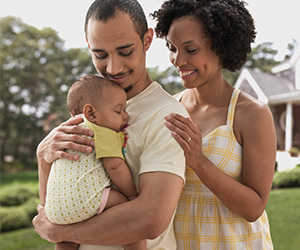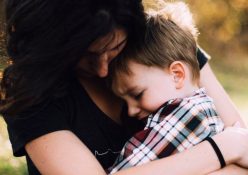For any parent, losing a child is probably the worst nightmare imaginable. By Claire Barnardo
 That morning, Jules and her husband Simon slept past 6 am. It was unusual for them and they remarked on how they had never slept that late before, since their son Jude was an early riser. ‘He was usually ready for action by 4:45 am. So I decided to go and check on him, and I found him dead in his cot,’ says Jules.
That morning, Jules and her husband Simon slept past 6 am. It was unusual for them and they remarked on how they had never slept that late before, since their son Jude was an early riser. ‘He was usually ready for action by 4:45 am. So I decided to go and check on him, and I found him dead in his cot,’ says Jules.
They had lost their precious 18-month-old, blue-eyed baby boy. ‘I was walking around our home with a dead baby in my arms and I had no idea what one does with a dead baby. At that point, it felt like someone had literally reached inside my chest and wrenched my heart out. I didn’t really think that I could breathe again, let alone find the desire to live,’ she says.
Making it through the day
Jules Morgan, 35, a photographer who lives in Cape Town, didn’t know what to do with herself after the forensic van had driven off with her son, Jude. ‘We couldn’t sit still; we went to a beach and walked and walked and walked. In the weeks that followed, we would walk somewhere every day and swim in the ocean. For a long time, we felt that we had let Jude down – how could we not have known that he was going to die overnight?’ she says.
Not supposed to happen
Counselling and forensic psychologist Rita Suliman believes that when a child dies, it’s so devastating because it’s the complete reversal of the natural order. ‘This is further compounded by the fact that all parents feel responsible for their children’s lives and parents also wonder where they went wrong,’ says Rita.
Psychologist Carol Jamieson agrees parents are left with many feelings, with self-condemnation and incompetence high on the list. ‘They feel as if they’ve failed to protect their child from death, even if there was nothing they could have done. They’re plagued by questions and self-recriminations: “We should’ve taken more precautions” or “If only we could have taken a different course of action”,’ she says.
The long road ahead
As the loss is so great, the time period of adjustment can be uncertain and learning to cope again can be an incredibly hard journey. ‘Recovery is something parents often feel they never achieve after the death of a child. Some parents feel so shattered, they speak of never being the same again or not wanting to carry on living, or may dissociate to cope.
‘The shock can render them helpless and numbed to a point of either not being able to express their grief, or just being emotionally broken,’ says Carol.
The will to go on
Learning to cope and live again after the loss is unimaginable, yet it’s part of the healing process. Experts suggest parents talk to a psychologist, church minister or counsellor who can facilitate working through the grief process and fluctuating emotions. It’s also important to bear in mind that, if there are other kids in the family, they will also need additional support. Carol suggests an insightful friend be the contact person between the family and various social systems. On a personal level, journaling or free-writing can assist with working through emotions.
For Jules and Simon, friends of theirs sponsored grief-counselling sessionsto help them talk about what they were going through. ‘Some of the best advice we got was to be kind to ourselves. I met with other moms who had lost children in a similar way and at a similar age and I saw them survive. I wrote every day about my feelings and found writing to be very therapeutic. I think the most helpful thing was falling pregnant with our little girl, Mikaela. It was so lovely to have life grow inside me again after going through such a huge loss, and to know that we would be parents again,’ says Jules.
Remember the good times
When you’re ready, it’s important to pay tribute to your child. For Jules, talking to her daughters about Jude and the brother they never met is vital. She says that people often avoid talking about the dead child, but that it’s important – especially to the parents, who want to know that their child is remembered.
‘There are times when a wave of grief still hits you when you least expect it… Seeing other kids having their first days at school, little blond, blue-eyed boys who remind me of him, circumstances where you least expect to feel sad and you do. Then I remember the bit about being kind to myself and just go with it. Just be there,’ Jules says.
For parents dealing with loss
• Any words of consolation will seem flippant to you. Most people honestly don’t know how to handle your pain and say the first things that come to mind. No one will know how you feel.
• You will be given lots of well-meaning advice, but don’t feel pressured by what you are told. Work through your grief at your own pace.
• Don’t shut yourself off from others in your family. Try to speak with them about how you feel.
• Don’t feel pressured to clear away things that belonged to your child. Do it at your own pace. Religious rituals can assist with this process.
• Commemorate various special days, such as birthdays and the anniversary of your child’s death.
• Try to do something in memory of your child. During family mealtimes, for example, you and your family can talk about memories you have of your lost child.
Useful contact
compassionatefriends.org







